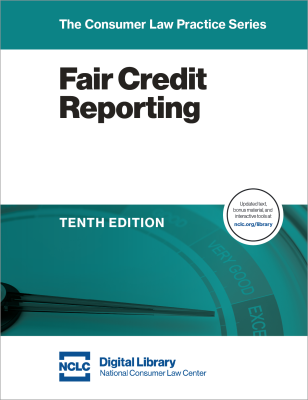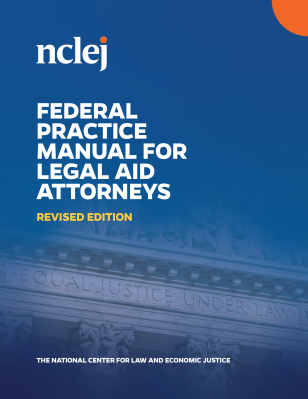On February 8, 2024, the Supreme Court in Dep’t of Agric. Rural Dev. Rural Hous. Serv. v. Kirtz, 2024 WL 478567 (U.S. Feb. 8, 2024), ruled unanimously that sovereign immunity does not prevent consumers from suing federal agencies for damages under the Fair Credit Reporting Act (FCRA). This ruling has widespread implications for consumers using the FCRA to recover damages from federal agencies, and even for consumer litigation against federal agencies under other federal statutes. This article also considers FCRA suits against state and local government agencies.
The Supreme Court Ruling
In Kirtz, the consumer disputed with a consumer reporting agency (CRA) that the consumer was still obligated on a mortgage secured from the Rural Housing Service (RHS), a division of the U.S. Department of Agriculture (USDA). The consumer alleged that USDA, the entity furnishing this information to the CRA, did not reasonably investigate the dispute after the CRA notified USDA of the dispute, a claim that could lead to a damage recovery against USDA. See NCLC’s Fair Credit Reporting § 6.10.
USDA responded by arguing that sovereign immunity prevented consumers from recovering damages from a federal agency. The consumer argued that the FCRA’s language waives federal sovereign immunity. The Courts of Appeals are split on this issue, with the Third, Seventh, and D.C. Circuit holding that the FCRA did waive sovereign immunity, while the Fourth and Ninth Circuit disagreed. See NCLC’s Fair Credit Reporting § 11.2.2.2.2. The Supreme Court accepted certiorari to resolve the split.
The Court ruled that the language of a statute is determinative and legislative history is irrelevant. In Kirtz, the Court ruled unanimously that language in the FCRA waived sovereign immunity.
The consumer alleged violations of the furnisher’s obligations under 15 U.S.C. § 1681s-2(b) to reasonably investigate the consumer’s dispute referred from a CRA. That provision applies to a “person” who furnishes information. Money damages are available under FCRA §§ 1681n and 1681o against “[a]ny person” who willfully or negligently fails to comply with § 1681s-2(b). (emphasis added)
FCRA § 1681a(b) then defines the term “ ‘person’ ” to include “any … governmental … agency,” which includes a federal agency as a governmental agency. FCRA § 1681a(a) provides that “Definitions and rules of construction set forth in this section are applicable for the purposes of this subchapter [the FCRA].” This includes §§ 1681n and 1681o. Since the FCRA explicitly permits consumer damage claims against federal agencies, the Supreme Court held this constituted a waiver of sovereign immunity, allowing the consumer’s damage claim to proceed.
Kiztz Applies to All Federal Agencies Furnishing Negative Information
Nothing in Kirtz limits the ruling to the USDA. Instead, under Kirtz, Congress waived sovereign immunity as to FCRA claims against any federal agency furnishing information to a CRA and failing to properly investigate a consumer’s dispute. As a result, the ruling has application to other federal agencies that furnish information to CRAs, such as the Department of Veterans Affairs for mortgage loans, the Department of Education for federal student loans, and the Social Security Administration for unpaid overpayment obligations. The ruling applies to any type of information that any federal agency furnishes to a CRA, and not just credit information.
Kirtz Applies to Federal Agencies Obtaining or Using Information Without a Permissible Purpose
The FCRA provides at § 1681b(f) that “a person” shall not obtain or use a consumer report without a permissible purpose. Thus, the Kirtz holding should apply equally to federal agencies as users of consumer reports as it does to those furnishing information to CRAs. While only certain federal agencies may furnish information to CRAs, other federal agencies may obtain and use consumer reports.
NCLC’s Fair Credit Reporting Chapter 7 examines permissible purposes for obtaining or using a consumer report. Note that the FCRA specifically allows governmental agencies to obtain from CRAs limited identifying information about a consumer (name, address, former addresses, places of employment, or former place of employment) without a permissible purpose. See 15 U.S.C. § 1681f; NCLC’s Fair Credit Reporting § 7.2.10.2.
Another provision allows the Federal Bureau of Investigation to access consumer information, subject to a number of constraints. See FCRA §1681u(a)–(d). Failure to respect those constraints can expose “[a]ny agency or department of the United States” to “liab[ility] to the consumer” for money damages. 15 U.S.C. § 1681u(j). The Supreme Court in Kirtz noted that the fact this provision waives sovereign immunity did not mean that Congress was “’foreclose[d] … from using different language to accomplish th[e] same goal’ in a different set of amendments to the same law.” Kirtz, at 8.
Outside of the above provisions, a federal agency must have a permissible purpose for obtaining a consumer report, such as use in connection with an eligibility determination for benefits or a license. 15 U.S.C. § 1681b(a)(3)(d). Also, a federal employee may be liable in their personal capacity for obtaining information for impermissible purposes. See NCLC’s Fair Credit Reporting § 7.7.1.
Other FCRA Claims Against Federal Agencies
Federal agencies are generally not considered to be CRAs and thus are not subject to the FCRA provisions regulating CRAs. See NCLC’s Fair Credit Reporting §§ 2.5.7, 11.2.2.2.2.
On the other hand, FCRA § 1681d(a) places certain requirements on a “person” procuring or causing to be prepared an investigative consumer report on any consumer. Thus, the FCRA’s investigative report provisions also can lead to damage remedies against federal agencies, since they are a “person” and sovereign immunity is waived by the FCRA statutory language. An investigative consumer report is one dealing with a consumer’s character, reputation, personal characteristics, or mode of living obtained from personal interviews. For more on investigative reports, see NCLC’s Fair Credit Reporting Chapter 15.
Bringing FCRA Claims Against State and Local Agencies and Quasi-Agencies
While Congress has waived sovereign immunity as to FCRA claims against federal agencies, Congress did not do so for FCRA claims against states. Under the Constitution’s Eleventh Amendment, states—as sovereigns—are immune from suit in federal court absent consent or a valid abrogation of that immunity by Congress.
Since Congress enacted the FCRA under the Commerce Clause, it was not empowered to abrogate a state’s Eleventh Amendment immunity through the FCRA. See Seminole Tribe of Florida v. Florida, 517 U.S. 44 (1996). See generally NCLC’s Fair Credit Reporting § 11.2.2.2.3; NCLEJ, Federal Practice Manual for Legal Aid Attorneys § 8.1.3 (now free on the NCLC Digital Library after checking out from the bookstore).
As a result, neither a state nor its officers acting in their official capacities may be held liable in federal court under the FCRA for money damages. This sovereign immunity extends to state agencies as well. See NCLC’s Fair Credit Reporting § 11.2.2.2.3.
Whether local government entities and quasi-government entities have sovereign immunity from suit under the FCRA will depend on whether they are “arms of the state.” However, the mere fact that a state has some involvement with an agency does not automatically make it an arm of the state. The entity asserting sovereign immunity bears the burden of demonstrating that it is an arm of the state. See NCLC’s Fair Credit Reporting §§ 11.2.2.2.1, 11.2.2.2.3.
When an FCRA claim is not available in federal court, an FCRA damages claim might possibly be available against state agencies in state court. The Eleventh Amendment only applies to federal court litigation and the FCRA also clearly applies to state agencies. However, states are immune from suits in their own courts unless they waive it, which Congress cannot do via a federal cause of action under the Commerce Clause, Alden v. Maine, 527 U.S. 706 (1999), as well as immune from suits in the courts of other states, Franchise Tax Bd. of California v. Hyatt, 139 S. Ct. 1485 (2019).
Implications of Kirtz for Other Statutory Claims Against Federal Agencies
There is nothing unique about the FCRA. The ruling in Kirtz finding a waiver of federal sovereign immunity should apply to any federal statute that provides obligations and a damage remedy against “persons” and defines persons as including governmental agencies. For example, the Equal Credit Opportunity Act defines person as “a natural person, a corporation, government or governmental subdivision or agency, trust, estate, partnership, cooperative, or association.” See 15 U.S.C. § 1691a(f).




